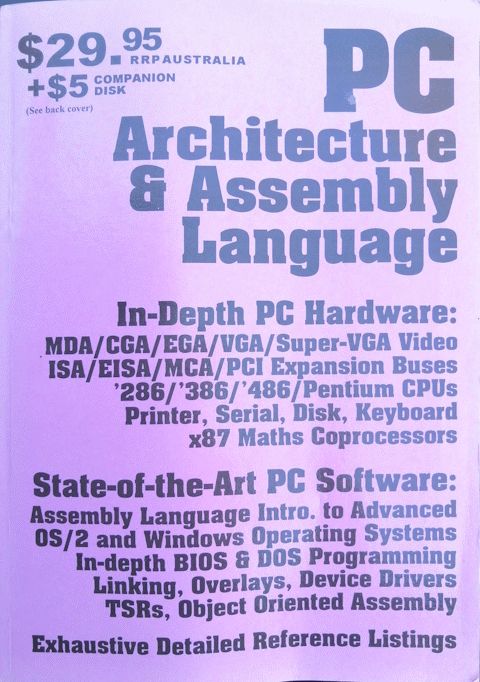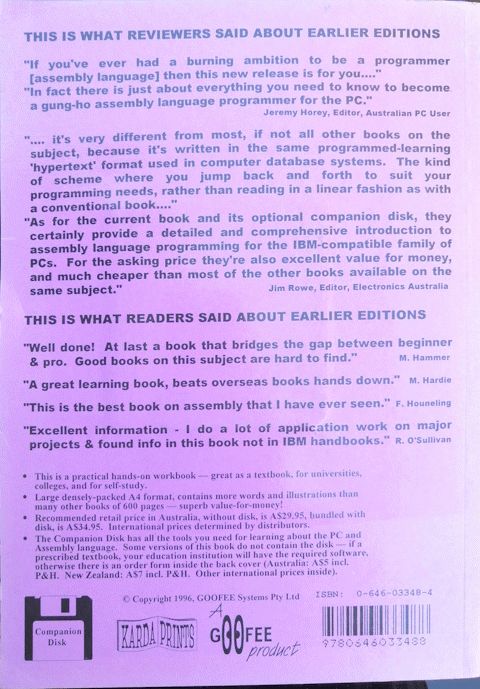PC Architecture & Assembly Language book
Wow, this has brought back memories! I received a message on the Puppy Forum from Colin. Here it is:
Hi Barry,
This message has been on my list for a long time, but for some
reason I've never got around to sending.
I was a student in your Microprocessors class at Edith Cowan
back in 1993, and it genuinely was my favourite during my
undergrad degree (which ironically was not a science or IT
major) and was absolutely the fuel that elevated my interest in
computing beyond hobbyist. While I spent the better part of
20yrs in law enforcement, I eventually left government and
transitioned to cyber security, making use of the fundamentals I
learned in your class, and even referring to your book again
when starting to dabble in malware analysis.
After almost 10 years abroad doing a variety of digital forensic
work, when I returned to Australia last year and unpacked some
boxes I again discovered your Assembly book among the few that I
kept. It sits proudly on my bookcase as a reminder that a strong
technical base goes a long way.
Thank you for your course, your enthusiasm as a teacher and for
the spark that took to me down a different path and a mentally
stimulating career living and working in places I never
expected.
I hope that you are well, and from your site it appears you are
enjoying pursuing both new and old interests.
Regards,
That book was initially, self-published, then got taken up by a publisher in the UK. They published the Third Edition. I retained the rights in Australia, and went on to release the Fifth Edition in 1996. The book was stocked in Dick Smith electronic stores throughout Australia and New Zealand, and was very popular.
At the Fifth Edition, I decided to pull the plug on it, and wrote to Dick Smith that was discontinuing it. Someone from Dick Smith phoned me and expressed disappointment as it was a good seller.
Those were the days of printed books, and people still wrote letters. I literally received hundreds of written testimonials (and emails) from people who loved the book, like Colin.
Snapshots of the Fifth Edition, front and back:

Back:

The book was prescribed at my university as well as a couple of other institutions. And that's where there is a somewhat bitter memory...
There was this subject, "Microprocessors" that I prescribed my book as the textbook. Fine, I received feedback like Colin's. However, one day a student came to the door of my office and proceeded to tell me how shitty my book was. Which came as a complete surprise, an opinion so totally at variance with all prior feedback.
What I found out was one of the lecturers was intensely jealous and was badmouthing the book to his students and other staff. The Microprocessors unit was a first-year unit and taken by many students, so there were parallel classes, including taught by that particular lecturer.
The thing is, I wasn't one of the boys, never went to the staff room at tea/lunch breaks, so was never part of the gossiping. Actually, there were two of them who were jealous. I was incredibly naive back then, and when discovered these back-stabbers was shocked, and lost interest in working at the university.
One of them used to be Coordinator for Microprocessors, but the
Head of Dept. took it away from him, gave the role to me. Another
reason for him to have a lingering resentment.
The last couple of years there, just went through the motions,
lacklustre performance, and resigned. To be more precise, I was
not tenured, on 3-year contracts, and resigned in the second year.
Then one of the senior lecturers asked if I would come back for
one more year, so I did, signed a one-year contract.
I am mentioning this negative memory, as it has in it an important lesson, that another young and aspiring young person who might read this, should learn.
Don't take the above as complaining. No, it was a lesson in life, and I learned from it. What is the lesson? Well, it depends whether you are in a competitive environment of not. If so, and you don't excel relative to your peers then you are OK, otherwise be wary. Also, don't be an outsider, like I was; be pally with the bosses!I should mention something else, as contrast. I lectured at a
couple of technical colleges for 5-6 years, and my peers were such
a laid-back easy-going bunch of guys. Good memories.
After that book, I wrote "Windows Assembly Language & Systems Programming", that was published by an international publisher. Then wrote "Flow Design for Embedded Systems", followed by a 2nd edition.
I see that secondhand editions of my books are still available, though I wouldn't recommend them these days. The two systems programming books are just too old. "Flow Design for Embedded Systems" 2nd edition is still in print I think -- I was receiving royalty checks up until a couple of years ago, then I asked them to just give it to a charity, as the checks were too small to process.
Just now checked, yeah, looks like the flow design book is still being published:
https://www.amazon.com.au/Flow-Design-Embedded-Systems-Object-Oriented/dp/087930555X

That was a new paradigm for graphical code design, with C code generation. Particularly good for creating little operating systems.
However, it never caught on, I think because too esoteric. At the
time, early 2000s, I lost interest in it. Typical of me back then;
intensely interested in something for awhile, then just dropping
it. Went on to create "Embedded Vector Editor" (EVE), then circa
2002, Linux, then Puppy.
I picked the book up a few months ago, wondering if I should
revisit the topic, but actually had trouble understanding what I
had written! Could get back into it, as know some improvements
that could be made, but still too much involved in EasyOS, don't
have the time for anything else.
Tags: tech
